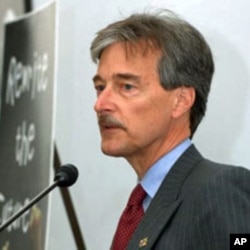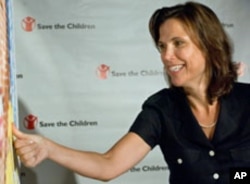Millennium Development Goals, set by the United Nations 10 years ago, include initiatives to protect the environment, increase development aid, open the global trading and financial system, promote equality for women, and reduce maternal mortality by three-quarters and child mortality by two-thirds. Accomplishing these goals has been the responsibility of more than 180 countries which agreed in 2000, at the original Millennium Development Goals summit, to work with public and private groups to achieve success on behalf of the world’s needy.
One of the non-governmental organizations which has been working with world leaders to implement the eight Millennium Development Goals, is the U.S.-based Save the Children. The international independent organization works in 120 countries on all seven continents providing support to more than 60 million children and millions of others, including caregivers, community members, local organizations and government agencies.
VOA spoke with Michael Klosson, a former U.S. Ambassador and longtime advocate for children, who is now Vice President for Policy and Humanitarian Response for Save the Children.
|
Full VOA interview with Michael Klosson of Save the Children:
|
VOA: The Millennium Development Goals, also known and MDGs, are not necessarily known to everyone, but Save the Children, we understand, believes the goals affect everyone.
Michael Klosson: The Millennium Development Goals are an agenda that world leaders put together to guide action when they convened the first Millennium Goals Summit in 2000. They set eight goals that are aimed at helping people in the developing world lift themselves up. They are based on a partnership with 189 governments which have subscribed to them.
It is very important, at the New York summit that we assess progress that has been made and the challenges which we face, and define a way forward to energize people so we can actually achieve the Millennium Development Goals.
VOA: What can the private sector, organizations such as Save the Children, do to make sure the Millennium Development Goals are accomplished?
Michael Klosson: NGOs (non-governmental organizations), such as Save the Children work on the community level in a lot of countries. Improving the survival rates of children is what we are about. We have the kind of knowledge of what will prevent children from getting the diseases in the developing world. We pass this knowledge onto trained community health workers in the countries where we work. That is one of the ways we can help advance the MDGs.
In Bangladesh, for instance, there are community health workers who are usually women in their 20s. They have not been to college, yet they can be trained so they can play a dramatic role in reducing the health care of children.
U.N. Secretary General Ban Ki-moon says he has a particular interest in Millennium Goals Four and Five which deal specifically with newborns and mothers in need around the world.
That is where organizations such as Save the Children come into the story. Mary Beth Powers, Chief of Save the Children's Newborn and Child Survival Campaign, attended the U.N. summit. VOA also spoke with her.
VOA: Is Save the Children involved in promoting the goal to launch a new nutrition movement which experts believe could save 2.7 million children a year?
|
Full VOA interview with Mary Beth Powers of Save the Children:
|
Mary Beth Powers: Nutrition is critical for newborns and mothers in the first thousand days of a child's life. Breast feeding, of instance, is a critical intervention. If regular breast feeding were done by mothers in all developing countries we could reduce about 13 percent, or more than one million children, who die every year. Breast feeding protects a child against infection, as well as being the best nutrition for a baby.
We are very concerned about the focus on nutrition which is part of Millennium Goal One. We are excited that U.S. Secretary of State Hillary Clinton and others are supporting new initiatives to pay more attention to how countries are performing on nutrition indicators around the world and measure the resulting reduction in child malnutrition.
VOA: Since private groups, such as Save the Children and others have limited resources, so you rely upon health care professionals in country accomplish your goals?
Mary Beth Powers: A big part of Save the Children's campaign for Millennium Goals Four and Five is to train more health workers. We train community members to diagnose and treat the biggest killers of children such as pneumonia and diarrhea.
We also train community midwives in countries such as Pakistan and Afghanistan where it is really important to have a woman from the community who is skilled at delivering babies and can recognize complications and seek appropriate care for newborns and mothers. It is really important that ministries of health have enough health workers. We are about four million health workers short around the world.
For more information about the Millennium Development Goals, go to the United Nations website: www.un.org/millenniumgoals.
For more information about Save the Children: www.savethechildren.org.





